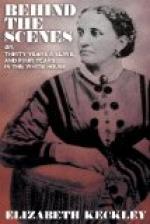About one hundred and sixty slaves, besides children, all owned by McGee, were worked on the farm. Instead of ginning two or three bales of cotton a day, as at Pontotoc, they ginned six to seven bales here.
* * * * *
Incidents.
I remember well the time when the great Swedish singer, Jenny Lind, came to Memphis. It was during her famous tour through America, in 1851. Our folks were all enthused over her. Boss went in and secured tickets to her concert, and I was summoned to drive them to the hall. It was a great event. People swarmed the streets like bees. The carriages and hacks were stacked back from the hall as far as the eye could reach.
On another occasion, when the great prodigy, Blind Tom, came to Memphis, there was a similar stir among the people. Tom was very young then, and he was called the Blind Boy. People came from far and near to hear him. Those coming from the villages and small towns, who could not get passage on the regular trains, came in freight or on flat bottom cars. The tickets were $5.00 each, as I remember, Boss said it was expensive, but all must hear this boy pianist. Many were the comments on this boy of such wonderful talents. As I drove our people home they seemed to talk of nothing else. They declared that he was indeed a wonder.
* * * * *
Longing for freedom.
Sometimes when the farm hands were at work, peddlers would come along; and, as they were treated badly by the rich planters, they hated them, and talked to the slaves in a way to excite them and set them thinking of freedom. They would say encouragingly to them: “Ah! You will be free some day.” But the down-trodden slaves, some of whom were bowed with age, with frosted hair and furrowed cheek, would answer, looking up from their work: “We don’t blieve dat; my grandfather said we was to be free, but we aint free yet.” It had been talked of (this freedom) from generation to generation. Perhaps they would not have thought of freedom, if their owners had not been so cruel. Had my mistress been more kind to me, I should have thought less of liberty. I know the cruel treatment which I received was the main thing that made me wish to be free. Besides this, it was inhuman to separate families as they did. Think of a mother being sold from all her children—separated for life! This separation was common, and many died heart-broken, by reason of it. Ah! I cannot forget the cruel separation from my mother. I know not what became of her, but I have always believed her dead many years ago. Hundreds were separated, as my mother and I were, and never met again. Though freedom was yearned for by some because the treatment was so bad, others, who were bright and had looked into the matter, knew it was a curse to be held a slave—they longed to stand out in true manhood—allowed to express their




